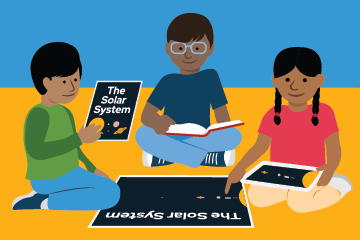Answering your questions on multilingual learners and literacy

Educators working with multilingual learners often ask: How does WIDA’s work intersect with reading instruction? How does language development relate to literacy? And how do the ACCESS for ELLs domain scores for reading link to literacy?
At WIDA, our focus is on language — the foundation that supports literacy learning. We help connect reading instruction and language development. We strive to provide educators with tools and resources to support multilingual learners (MLs) as they develop the language for engaging with literacy instruction, particularly in the context of content area learning.
In this article, you’ll find answers to some frequently asked questions about WIDA’s role in literacy. This is part one of a two-part series. Read part two here.
What Is WIDA’s Role in Literacy Instruction for MLs?
WIDA supports students, families, educators and administrators with high-quality, research-based tools and resources focused on language development for MLs. Our goal is to ensure MLs — regardless of age or language level — have the opportunities to succeed in school.
We believe that the best way to support multilingual learners’ success is to support the entire education system. That means we create standards, assessments and teaching tools that help integrate language learning with all subject areas, including literacy within language arts, science, math and social studies. MLs need language support across all content areas, not just in English language development classes.
WIDA supports a vast network of educators working within our broad consortium of states and territories. We offer general strategies and tools for educators that can be adapted to fit different classroom settings and instructional priorities.
When it comes to literacy, WIDA outlines five guideposts for literacy instruction to help educators support the literacy development of MLs:
- Building on students’ cultural and linguistic assets, like their oral language development in their home language, so they are encouraged to leverage their background knowledge in reading and text comprehension
- Developing oral language skills through classroom interactions and discussions, as well as learning the meaning of new words and concepts in context-rich situations
- Expanding and strengthening vocabulary, word knowledge and word recognition to build a foundation of knowledge of words and ideas that students may encounter in texts, as well as the ability to connect this knowledge to what they already know in other languages
- Developing reading comprehension and academic literacies to give students multiple strategies to draw from when making sense of texts and to expand their ways of thinking and reasoning in different subject areas
- Fostering meaningful access to literacy learning to ensure that multilingual learners at any grade level have an appropriate mix of instruction that builds their reading skills and engages them in rich and authentic literacy practices
For a deeper dive into these strategies, watch the WIDA Webinar on the Reading Guideposts for Literacy Instruction With MLs.
How Do ACCESS for ELLs Domain Scores for Reading Connect to Literacy?
ACCESS for ELLs assesses the language needed for reading but not reading and literacy skills directly. English language development (ELD), as measured by WIDA, and reading and literacy skills, found in state English Language Arts (ELA)/literacy standards, are distinct.
As required by the Every Student Succeeds Act (ESSA), ACCESS for ELLs measures students’ progress in meeting the language expectations outlined in the WIDA English Language Development (ELD) Standards Framework, 2020 Edition.
ACCESS for ELLs does not assess the ELA/literacy constructs defined in state academic content standards.
What Exactly Does the Reading Domain in ACCESS for ELLs Assess?
ACCESS for ELLs has four domains — Reading, Writing, Speaking and Listening. The Reading domain measures the student’s language necessary to engage with reading materials across the content areas, as described in the WIDA ELD Standards Framework. Check out sample questions from the Reading domain on our Test Practice and Sample Items webpage. The WIDA ELD Standards Framework describes language expectations for MLs’ performance for the discourse, sentence and word/phrase dimensions of language.
- Students at higher grade and/or proficiency levels read longer passages with complex sentences, connectors and subject-specific vocabulary. The test assesses whether they can grasp meaning across the entire text.
- Students at lower grade and/or proficiency levels read short paragraphs and sentences or high-frequency words. Reading items usually contain three or four response options for students to select one correct option.
Different types of reading tests are used for different purposes, with different groups of students, and require different reading skills. ACCESS for ELLs assesses multilingual learners’ English language proficiency based on the WIDA ELD Standards Framework and does not assess general literacy skills.
What’s Next?
Our experts at WIDA are continuing to work on literacy-specific resources, tips and guidance for educators of MLs, while being mindful of the different sociocultural and educational contexts that students experience.
In the meantime, check out our Reading With Multilingual Learners webpage.
This resource hub offers research-based insights and practical tools to help you leverage the strengths MLs bring to the classroom to improve their reading comprehension and engagement. On the webpage, you will find the following:
- A video highlighting Carmen, an elementary teacher in Minnesota, who incorporates her students’ home literacy experiences into her teaching
- A series of WIDA Snapshots providing strategies to engage the unique strengths multilingual learners contribute to their literacy development
- Tools to gather information about students’ reading strengths and preferences and generate ideas for scaffolding reading instruction





